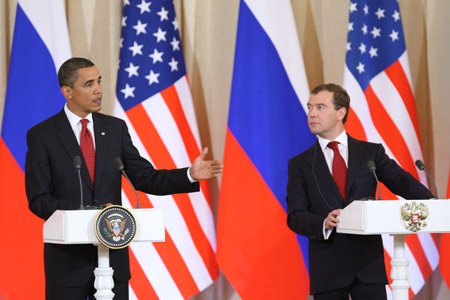Russian President Dmitri Medvedev and his visiting U.S. counterpart Barack Obama reached deals on a series of vital issues on Monday, including a cut in nuclear weapons and the transit of U.S. military cargos to Afghanistan via Russian territory.
Although the former Cold-War foes remain at odds over Georgia and the U.S. plans to deploy a missile defense system in Eastern Europe, the summit showed their intentions for better relations.

|
|
Russian President Dmitry Medvedev (R) and visiting U.S. President Barack Obama attend a joint press conference at the Kremlin in Moscow July 6, 2009. [Lu Jinbo/Xinhua]
|
Nuclear arms cut
High on the summit's agenda is a new nuclear arms control deal that will replace the Strategic Arms Reduction Treaty (START I) signed in 1991 between the United States and the Soviet Union.
Moscow and Washington started negotiations on nuclear arms control in the 1960s and have reached several agreements.
START I, due to expire in December, places a limit of 6,000 strategic or long-range nuclear warheads on both sides.
The subsequent 2002 treaty signed in Moscow called for a greater cut in nuclear warheads to between 1,700 and 2,200 by the end of 2012, but fell short of deals on verification.
The two leaders signed a document of understanding on nuclear weapon control during their talks. "We've taken important steps forward to increase nuclear security and to stop the spread of nuclear weapons," Obama said in the Kremlin's St. Andrew's Hall, a traditional meeting place for higher military officials.
Under the framework document adopted by the two presidents, within seven years after a new treaty comes into force, the limits for strategic delivery systems should be within 500-1,100 units and for warheads linked to them within 1,500-1,675 units.
"This legally binding treaty will be completed by the end of this year," Obama said. He expressed the hope that the two countries would reduce their nuclear arms by as much as a third and move even beyond that in subsequent treaties.
"There are regions where the presence of nuclear weapons may create colossal problems, and in these areas we should most closely work with our partners," Medvedev said.